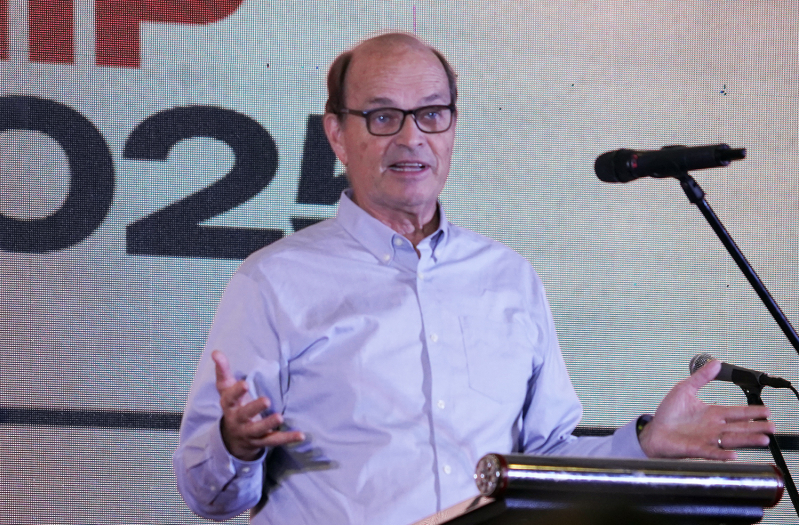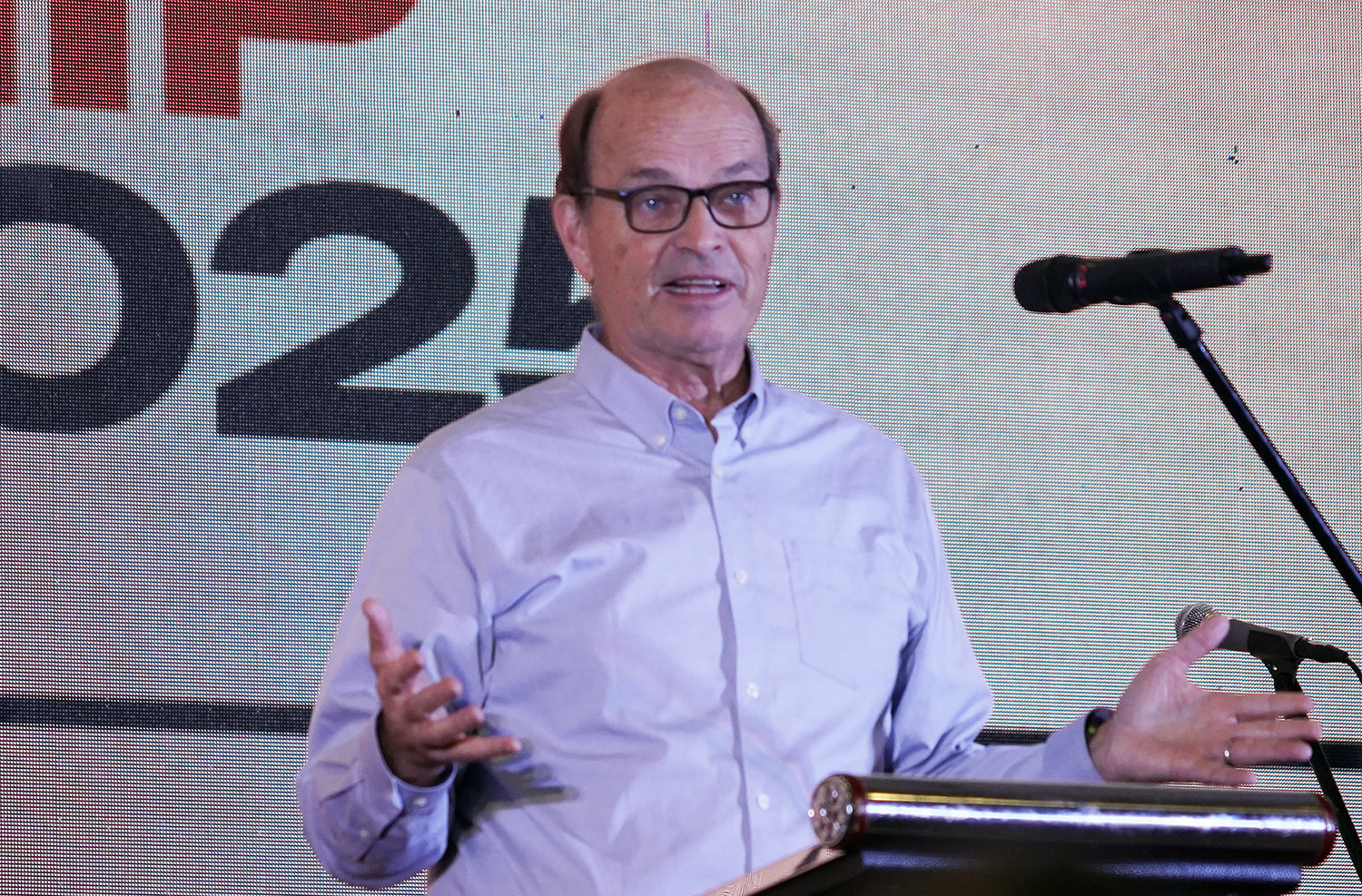
Dr. Paul Borthwick, senior consultant with Development Associates International and long-time missions advocate, delivered the closing devotional of the Arise Leadership Summit 2025 in Indonesia, urging attendees to live as “intentional influencers” committed to the global mission of the Church.
Speaking to participants from across Asia and beyond, Borthwick grounded his message in Scripture and personal experience, emphasizing that the call to missions is not restricted to geography, age, or background.
He framed his address around the theme of influence, calling on each participant to follow Jesus’ example by actively shaping the Church’s response to the Great Commission. “Jesus was the ultimate influencer,” he said. “He didn’t wait for people to come to him—he sought the lost. He gave his life. And then he said to his disciples, ‘Follow me.’”
Reflecting on his own journey, Borthwick shared how he made his personal commitment to global missions at age 19 during a student conference in the United States. His wife, who was also present at the same event, made a similar commitment—an experience that shaped their 46 years of shared ministry.
Referencing this, he encouraged younger participants not only to pursue God’s calling with clarity and courage but to ensure that those they marry share a similar level of commitment to Christ and his mission. “Your marriage will take on the temperature of the cooler person,” he said. “If one of you wants to reach the unreached, and the other wants a beach house, you can guess where you’ll end up.”
Borthwick highlighted the importance of intergenerational unity in the Church, noting that while believers may have different characteristics based on age or cultural background, their shared identity in Christ transcends such divisions. “We are family,” he said. “We may not always like everyone in our family equally, but we walk together. That’s the spirit of collaboration we’ve talked about all week.”
God’s vision has always been for the nations
Turning to Scripture, Borthwick anchored the biblical mandate for global mission in both the Old and New Testaments. Citing Genesis 12, Psalm 96, and Isaiah 49, he reminded attendees that God’s vision has always been for the nations—not just for a single people group or region.
“When our churches become inward-focused, concerned only about our city or our context, it’s not that the vision is bad—it’s just too small for God,” he said. “God told Abraham that through him all nations would be blessed. That theme runs from the beginning of the Bible to the end.”
He then examined the life of Jesus as the clearest model of influence and cross-cultural mission. From the arrival of the Magi—Gentiles from the East—as some of Jesus’ first visitors, to his interaction with Nicodemus in John 3, Borthwick emphasized that Christ’s mission was global from the start. He noted that Jesus said God loved “the world,” not just the Jewish people, and that Christ’s actions, teachings, and prayers consistently pointed to a purpose that extended far beyond national or religious boundaries.
Referencing Luke 19, he highlighted Jesus’ own words: “The Son of Man came to seek and save the lost.” This, Borthwick said, defines the posture that every believer should take.
Ready to give your life
Throughout the address, Borthwick interwove stories from Christian history and his global ministry experience. He recounted the sacrifices of British missionaries to Ghana, many of whom packed their belongings in coffins because they knew they would not return home.
According to church tradition, 60 percent of those missionaries died within the first two years, and some were buried beneath the pulpits of the churches they planted. But they did not only sacrifice their own lives, but their children also came with them and some of them died in the mission field as well.
“Giving up your life is one thing,” he said. “Losing your children is quite another. But that’s the kind of commitment that has marked the global Church throughout history.”
Influence through lifelong learning
Borthwick called on participants to cultivate influence through lifelong learning and biblical grounding. He traced the development of the modern missions movement, noting how the concept of unreached people groups gained traction only after the Lausanne Conference in 1974, when late missiologist Ralph D. Winter clarified the distinction between nations as political entities and ethne as biblical people groups.
He also emphasized the importance of being able to explain the reality of lostness from Scripture, challenging the trend in some churches to downplay the need for evangelism by affirming the sincerity of other religions. “The Bible says that whoever believes is saved—and whoever does not is not,” he said.
He also stressed the importance of cultural knowledge, sharing how knowing the geography and customs of various nations has helped him connect with international students and leaders. “Knowing where someone comes from is one of the simplest ways to make them feel seen,” he said.
Another key theme in Borthwick’s message was the power of prayer. He shared how one U.S. church had been praying for the Miao people of China for five years. At a missions dinner for international students, one student approached him and asked why the church had posters saying, “Pray for the Miao.” The student then said, “I am Miao.” The moment, Borthwick said, was a reminder that God not only sends believers out but sometimes brings the nations to them. “When you pray to the Lord of the harvest, sometimes he brings the harvest to your doorstep.”
Borthwick encouraged participants to take action locally as a way of preparing for global mission. He described his own first exposure to international ministry through a short-term trip to Haiti, which he said confirmed his calling to cross-cultural engagement. “I had never even been on a plane before,” he said. “But that trip awakened something in me. I asked Jesus into my life in 1971. I asked the world into my heart in 1978.”
Leading by example
In the final portion of his message, Borthwick emphasized the importance of personal accountability in the mobilization process. He noted that those who encourage others to go to the nations must also be open to the possibility that God is calling them to go as well.
He shared the story of a woman in his church named Marian, who at age 68 asked to be sent into the mission field. With a background in nutrition, she began a feeding program in Haiti that eventually grew to serve 2,000 children. She returned to Haiti 40 times before her death at age 86, continuing her ministry even after multiple cancer diagnoses.
“She used to say [to a group of people in their 70s and up], ‘Some of you are afraid to go on a mission trip because you’re afraid you might die. But look at your age—you’re going to die anyway. And it’s cheaper to be buried in Haiti,’” he said, noting her humor and deep sense of calling.
Borthwick concluded by returning to the words of Jesus in John 20:21: “As the Father has sent me, I am sending you.” He urged participants to live as “sent ones,” regardless of whether their mission field is local or global.
“You don’t have to ask if you are sent. You only have to ask where,” he said. “Live as sent people—so that all the peoples of the earth might know who He is.”
News Source : https://www.christiandaily.com/news/dr-paul-borthwick-urges-arise-summit-participants-to-live-as-sent-influencers
 Your post is being uploaded. Please don't close or refresh the page.
Your post is being uploaded. Please don't close or refresh the page.





